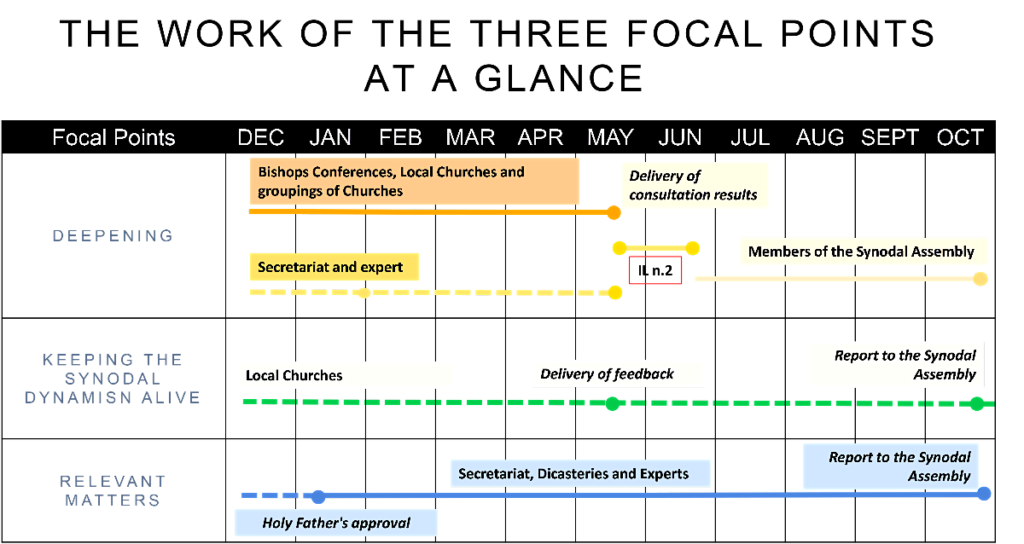VATICAN: Issues Framework for Second Phase of Synod on Synodality

Synod 2024 timetable
Sr. Jecinter Antoinette Okoth, FSSA
As the Church continues with the three-year synodal journey that commenced in October 2021, the Vatican through the General Secretariat of the Ordinary Council of the Synod has provided a structure that highlights steps to be taken after the first session that was in October 2023 until the second session to be in October 2024.
Vatican officials noted in the statement dated Saturday, December 11, that the synod process is an inspiration. Those who participated at various levels (national, regional, and continental), during the listening and consultation phase, and also at the first session “have had a concrete experience of a Church that is plural and able to live with differences as a richness in communion.”
Therefore, the synodal experience according to the statement, “constitutes a prophetic word addressed to a world that finds it hard to believe that peace and concord are possible (yet) we are called and sent by the Risen One to proclaim the Gospel to the world today.” This encounter recognizes the aspect of unity in diversity as the people of God identify each other as “disciples called and sent by the Lord.”
As the Church begins the journey for the second synodal phase, the three levels: national, regional, and continental), have been linked with that of the Church as a whole as the Holy Father insists that, “the Synod is about synodality and not about this or that theme…. The important thing is how the reflection is done, that is, in a synodal way.”
The framework provides that “The local Churches and the groupings of Churches are firstly invited to contribute by deepening aspects of the Synthesis Report (from the first session) that are fundamental to the Synod’s theme” of communion, participation and mission. This will be guided by the question “How can we be a synodal Church in mission?
The statement elaborates that the intent of the new reflection question “is to identify the paths we can follow and the tools we might adopt in our different contexts and circumstances in order to enhance the unique contribution of each baptized person and of each Church in the one mission of proclaiming the Risen Lord and his Gospel to the world today.” It is, therefore, an “invitation for reflection on the concrete forms of the missionary commitment to which we are called, that express the dynamism between unity and diversity proper to a synodal Church.”
For a better reflection on the question, the officials propose re-reading no. 27 of the Pope’s Apostolic Exhortation Evangelii Gaudium “I dream of a ‘missionary option’, that is, a missionary impulse capable of transforming everything, so that the Church’s customs, ways of doing things, times and schedules, language, and structures can be suitably channeled for the evangelization of today’s world rather than for her self-preservation…”
The guiding question, therefore, needs to be addressed on two levels: at the level of each local Church and the level of relations between churches, between groupings of churches at different levels, and with the Bishop of Rome.
Each local Church is invited to carry out a further consultation, as per their context. After which the Local Churches draw a summary of a maximum length of 8 pages, to be sent to the General Secretariat of the Synod by 15 May 2024. On the basis of the material thus gathered, the Instrumentum laboris of the Second Session will be drafted.
The Vatican underscores the need to keep the synodal dynamism alive, thus “the local churches are invited to go through the entire Synthesis Report and collect the requests that are most consonant with their situation.”
On this basis, reads part of the Saturday statement, “They will be able to promote the most appropriate initiatives to involve the whole People of God such as the formative activities, theological in-depth studies, celebrations in synodal style, grassroots consultations, listening to minority populations and groups living in conditions of poverty and social marginality, spaces in which to address controversial issues, etc.), using the methods already successfully adopted during the first phase in particular Conversation in the Spirit.”
While carrying out this exercise, “each diocesan or eparchial bishop has an irreplaceable role in providing stimulus: it is his task to open and accompany this further consultation in his own Diocese or Eparchy, and then validate its outcomes…. and to play a coordinating role for the local Churches.”
Additionally, the Episcopal Conferences and the Oriental Hierarchical Structures are “to continue to promote initiatives enabling growth as a synodal Church in mission, including
groupings of Churches and to collect the testimonies and good practices prepared by the Dioceses and Eparchies and send them all, without summarising them, to the General Secretariat of the Synod, again by 15 May,” reads the message sent to the Patriarchs and Major Archbishops of the Eastern Catholic Churches, the Presidents of Episcopal Conferences and all Bishops and Eparchs of the Catholic Church.


